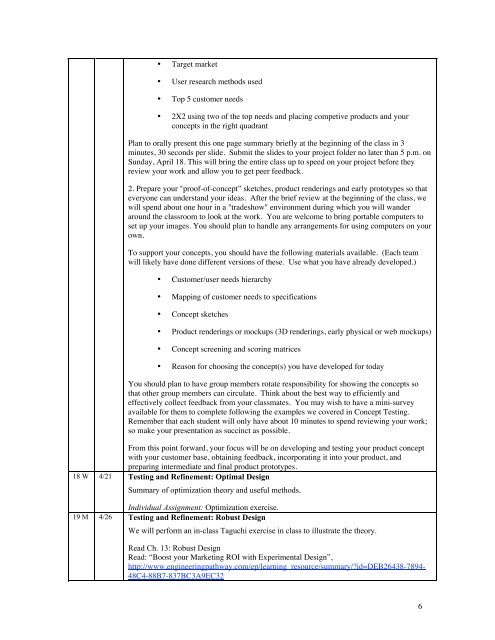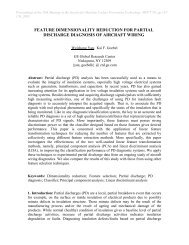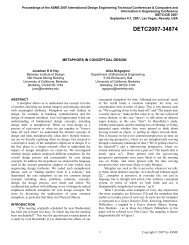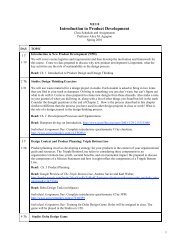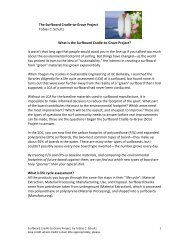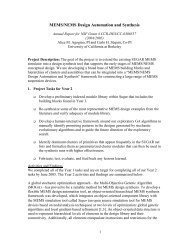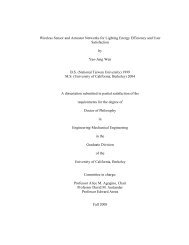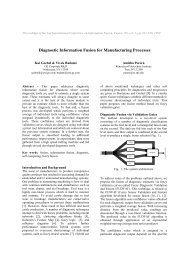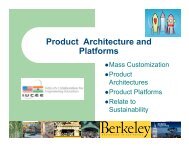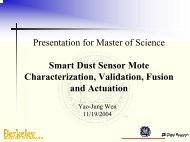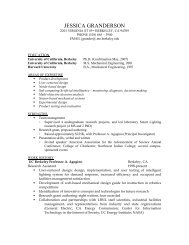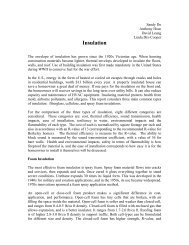Syllabus/Schedule - Berkeley Expert Systems Technology Lab
Syllabus/Schedule - Berkeley Expert Systems Technology Lab
Syllabus/Schedule - Berkeley Expert Systems Technology Lab
You also want an ePaper? Increase the reach of your titles
YUMPU automatically turns print PDFs into web optimized ePapers that Google loves.
• Target market<br />
• User research methods used<br />
• Top 5 customer needs<br />
• 2X2 using two of the top needs and placing competive products and your<br />
concepts in the right quadrant<br />
Plan to orally present this one page summary briefly at the beginning of the class in 3<br />
minutes, 30 seconds per slide. Submit the slides to your project folder no later than 5 p.m. on<br />
Sunday, April 18. This will bring the entire class up to speed on your project before they<br />
review your work and allow you to get peer feedback.<br />
2. Prepare your "proof-of-concept” sketches, product renderings and early prototypes so that<br />
everyone can understand your ideas. After the brief review at the beginning of the class, we<br />
will spend about one hour in a "tradeshow" environment during which you will wander<br />
around the classroom to look at the work. You are welcome to bring portable computers to<br />
set up your images. You should plan to handle any arrangements for using computers on your<br />
own.<br />
To support your concepts, you should have the following materials available. (Each team<br />
will likely have done different versions of these. Use what you have already developed.)<br />
• Customer/user needs hierarchy<br />
• Mapping of customer needs to specifications<br />
• Concept sketches<br />
• Product renderings or mockups (3D renderings, early physical or web mockups)<br />
• Concept screening and scoring matrices<br />
• Reason for choosing the concept(s) you have developed for today<br />
You should plan to have group members rotate responsibility for showing the concepts so<br />
that other group members can circulate. Think about the best way to efficiently and<br />
effectively collect feedback from your classmates. You may wish to have a mini-survey<br />
available for them to complete following the examples we covered in Concept Testing.<br />
Remember that each student will only have about 10 minutes to spend reviewing your work;<br />
so make your presentation as succinct as possible.<br />
From this point forward, your focus will be on developing and testing your product concept<br />
with your customer base, obtaining feedback, incorporating it into your product, and<br />
preparing intermediate and final product prototypes.<br />
18 W 4/21 Testing and Refinement: Optimal Design<br />
Summary of optimization theory and useful methods.<br />
Individual Assignment: Optimization exercise.<br />
19 M 4/26 Testing and Refinement: Robust Design<br />
We will perform an in-class Taguchi exercise in class to illustrate the theory.<br />
Read Ch. 13: Robust Design<br />
Read: “Boost your Marketing ROI with Experimental Design”,<br />
http://www.engineeringpathway.com/ep/learning_resource/summary/?id=DEB26438-7894-<br />
48C4-88B7-837BC3A9EC32<br />
6


